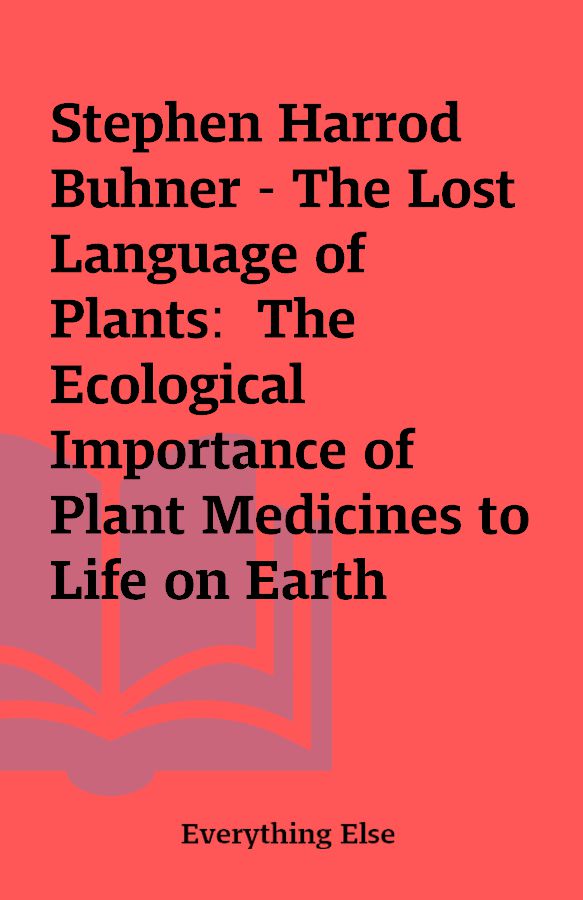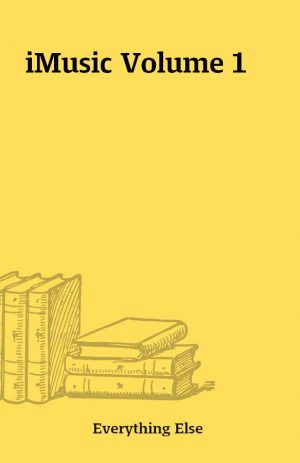Stephen Harrod Buhner – The Lost Language of Plants: The Ecological Importance of Plant Medicines to Life on Earth
Stephen Harrod Buhner – The Lost Language of Plants.mobi
[1 Ebook – Mobi]
Description
The Lost Language of Plants: The Ecological Importance of Plant Medicines to Life on Earth by Stephen Harrod Buhner2002 | MOBI | 336 pages | ISBN-10: 9781890132880 | ASIN: B005LOPNHU | English | 1.1 MBThis could be the most important book you will read this year. Around the office at Chelsea Green it is referred to as the “pharmaceutical Silent Spring.” Well-known author, teacher, lecturer, and herbalist Stephen Harrod Buhner has produced a book that is certain to generate controversy.It consists of three parts:A critique of technological medicine, and especially the dangers to the environment posed by pharmaceuticals and other synthetic substances that people use in connection with health care and personal body care.A new look at Gaia Theory, including an explanation that plants are the original chemistries of Gaia and those phytochemistries are the fundamental communications network for the Earth’s ecosystems.Extensive documentation of how plants communicate their healing qualities to humans and other animals. Western culture has obliterated most people’s capacity to perceive these messages, but this book also contains valuable information on how we can restore our faculties of perception.The book will affect readers on rational and emotional planes. It is grounded in both a New Age spiritual sensibility and hard science. While some of the author’s claims may strike traditional thinkers as outlandish, Buhner presents his arguments with such authority and documentation that the scientific underpinnings, however unconventional, are completely credible.The overall impact is a powerful, eye-opening expos’ of the threat that our allopathic Western medical system, in combination with our unquestioning faith in science and technology, poses to the primary life-support systems of the planet. At a time when we are preoccupied with the terrorist attacks and the possibility of biological warfare, perhaps it is time to listen to the planet. This book is essential reading for anyone concerned about the state of the environment, the state of health care, and our cultural sanity.About the AuthorStephen Harrod Buhner is the award-winning author of twenty-one books on herbal medicine, depth understanding of Gaian functioning and plant ecology, and the nature of meaning in language. He is a fellow of Schumacher College. For over thirty years, Stephen taught throughout the US, Canada, and Europe. He lives in New Mexico.Amazon Top Customer Reviews5.0 out of 5 starsA labor of love that speaks from every pageBy Cathleen M. Walker VINE VOICE on February 26, 2005Quote:This is one of the best books I have read in a long time. Thoughtful, poignant, well written, it even brought me to tears at some points. I learned so many things I didn’t know, which doesn’t happen for me very often, sad to say. I have a pretty good idea how destructive man has been to the environment, but there were chapters in this book that opened my eyes even further, particularly when it comes to the ripple effect of the pharmaceutical industry.But more than that, the author discusses with due respect the indigenous history of working with plants and how dismissing that history in the name of profit, power and control serves no one.This book is truly a labor of love that speaks from every page. I had no idea what a page-turner it would turn out to be. Consider yourself forewarned….geminiwalker5.0 out of 5 starslistening to plantsBy Kiko Denzer on March 2, 2003Quote:A couple of summers ago, in the midst of a blackberry glut, I decided I should harvest some Oregon Grape berries to mix with blackberry for a good, sour jelly. But I needed a whole patch, and a few individual plants were all I knew. Before I got around to looking, I found myself on a walk, huffing and puffing up my favorite steep hill. In the middle, I just stopped – for no obvious reason – and looked up. All around me, in the midst of the salal, was a thicket of Oregon Grape, laden with berries! My brother-in-law and I came back and filled up buckets. The deep purple, astringent berries made a stunning blend with the blackberries, and the jelly set up beautifully. But most stunning, even after we ate it all up, was how the plant showed itself in a place I’d been through a hundred times before without ever noticing it.Is that language? Maybe not But even if it only meant that I could make my jelly, it did have meaning, and to convey meaning is, after all, the purpose of language. The Lost Language of Plants is a book about meaning: not whether plants speak, or even how they speak, but what they say to us and we to them.Buhner says there is meaning to Life, and that plants communicate it clearly and fully through their chemistry and biology. In human industrial culture, however, the common values of Life – birth, growth, death, and renewal – have mutated into progress, wealth, and poverty – the trinity of economic growth. As a result, billions of years of evolution are being pushed to favor waste over renewal, and death over Life. Under human control, Life is a mere by-product of a soul-less, cosmic machine that happens to have produced “resources” that we can consume until they’re gone or until Life ends, whichever comes first.”Imagine a ball of twine the exact size and shape of Earth,” Buhner writes; “Better yet, telephone line. Take the end point of the line and weave it back into the beginning so that there is no beginning and no end. Every place the line crosses itself (you could think of them as synaptic junctions) messages cross over; communication travels quickly throughout the entire line itself as well. Academic disciplines are areas where a segment of line is cut out of the ball and studied. They explore its tensile strength, its molecular structure, its chemical composition, the colors and types of wires that run through it. Any communications that were flowing or might flow through it cannot be studied once it is cut out of the whole-only a tiny part of the picture can be seen. Misunderstandings easily arise, especially if the communications that flow through the line are the most important thing.”Turn the ball of telephone line back into Earth. Each plant, plant neighborhood, plant community, ecosystem, and biome has messages flowing through it constantly-trillions and trillions of messages at the same time. The messages are complex communications between all the different parts of the ecosystem. There is no beginning and no end, no cause and no effect. The three-and-a-half-billion-year-old feedback loops of Earth are so closely intertwined that there is always another cause underneath whatever cause you begin with. Impacts at any one point affect every other point in the system. Life is so closely coupled with the physical and chemical environment of which it is a part that the two cannot legitimately be viewed in isolation from one another. As James Lovelock says: `Together they constitute a single evolutionary process, which is self-regulating.'” (p 172)If, as Buhner suggests, we are the language, and the language is us, and the meaning of that language is the beauty of Life itself, then redemption is not an airy philosophical postulate, but an experimental result within the realm of reason and, perhaps, within the realm of possibility.5.0 out of 5 starsThis book is a mind altering substance…By catbird on June 4, 2002Quote:I am halfway through this book and plan to start right over again when I’m finished. I think that this is one of the most fascinating things I have ever read. BUT, if you asked me what it is about I’d have a hard time explaining it. Yes, it is about how chemicals are seeping into the ecosystem, and how we might view plant medicine as an alternative etc, but it’s about so much more than that. It’s scientific and shamanistic at the same time, merging two ways of thinking into one. Really I should say, it explains one type of epistemology in the language of another. I really like it and it’s changing my way of looking at the life around me. Also, my perception of God/spirituality etc. Check it out. PS. Mr Buhner thanks for such an interesting and thought provoking read! You are so right! KM5.0 out of 5 starsThe Title Says it AllBy Charles Andrew Wingard on December 24, 2004Quote:Stephen tackles the prescription drug industry without painting a doom and gloom scenario. He presents facts in a loving way so that the reader can understand why plants are important. Stephen sees a problem and offers a solution. A great book for anyone worried about prescription drugs, on prescription drugs, or interested in plants.5.0 out of 5 starsThe “Silent Spring” for our timesBy Byron E. Butchart on December 20, 2002Quote:This is a book you should read, and unlike many “should” reads, this one is a real pleasure. Stephen has taken on a huge task with this book, and almost tries to cover too much ground, but he pulls it off with style and art. Once you get past the wonderful language and the perceptive viewpoint you will stumble on a scathing and accurate depiction of what mainstream medicine is doing to the environment. It is a picture that makes “Silent Spring” seem tame in comparison, and the book as a whole will lift you up out of your chair and get you moving to find answers.5.0 out of 5 starsFacinating, Informative, Eye-OpeningBy A Customer on July 6, 2002Quote:Fascinating, informative and eye-opening, “The Lost Language of Plants” by Stephen Buhner shows us the life of evolving plant chemistries, revealing the science in the `magic’ of plants used as medicine by 4 of 5 people on the planet. A merciless exposé following the path of medical effluence through our soil, water, and air clearly illustrates effects on molecules as they change to affect generations to come… generations of all life: bacteria, plants, wildlife, and humans, as we reproduce. We have been participants in a medical experiment of reductionist technology for a few hundred years and the results are not widely known or circulated. Buhner’s well-researched and brilliantly conceived presentation refutes any denial one may have harbored before reading this book.Western thinking has its own way of seeing things and we live in the cradle of all that it produces. We see ourselves as an advanced society and display little use or respect for our elders, or those who have gone before us. Buhner’s language unveils the illusion embedded within our language and our thinking, embodies ancient understanding and functional relationships, and reveals the complex communication between all parts of the eco-system. Stephen Buhner, as scientist, intellectual, storyteller and shaman, teaches us a language so that we may see differently. This is a passionate call to reconnect to our biocentric origins, to nature, to save our planet and ourselves.
You must be logged in to post a review.






Reviews
There are no reviews yet.